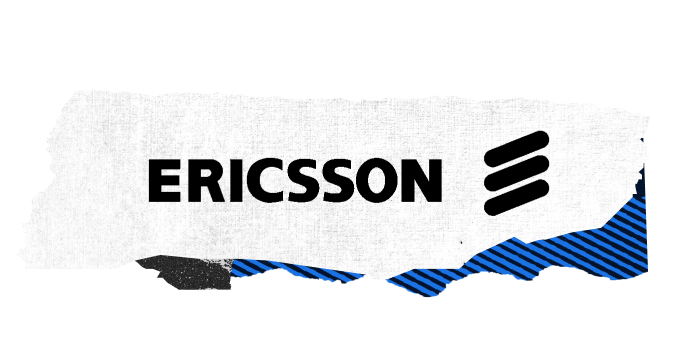Ericsson Learning Leaders Prepare Workforce for Tomorrow
With multiple learning platforms creating a complex and disparate skill building experience, learning leaders at Ericsson sought to simplify workforce development. The goal was to make learning a daily habit that matters and align L&D strategy with the “Quest for Easy,” a company-wide initiative designed to drive growth.




RESULTS
L&D Drives Innovation
Targeted and Personalized Learning
Degreed now sits at the top of the Ericsson learning tech stack, integrating all learning content from internal and external sources. By connecting people to learning and making it easy to access, Degreed plays a key role in making learning a daily habit across the organization. Connecting skill building to strategy with Degreed keeps Ericsson competitive and drives profitable growth.
A whopping 97% of workers and 99% of managers have active accounts — and up to 64% of the company’s people return monthly to keep learning.
Learning leaders have used quantitative data to gauge the effectiveness of Degreed at every stage of its implementation. During the pilot, 75% of participants who responded to a survey said they’d highly recommend the solution to a peer and gave it an impressive net promoter score (NPS) of 46. In addition, 74% of respondents estimated that Degreed would help them cut the time they spend searching for learning content in half. And 78% of learning professionals who responded estimated that Degreed reduced the time they’d spend creating learning in half.
In 2021 and with the pilot long finished, Ericsson employees continued to rate Degreed highly at an average NPS of 39 while ending the year at 43.
Ericsson is now a global leader in 5G technology and in building 5G skills — delivering new telecommunications and networking services and infrastructure to leading customer service providers around the world.
Teams and departments have used Degreed to successfully advance specific initiatives. For example, Degreed helped Sales L&D launch a future-focused, industry-recognized sales proficiency program called SET2WIN. Incorporating flexible learning Pathways, it was designed to reinforce existing skills, teach new capabilities and credential people who build, apply and amplify skills. It aligned skill-building with the latest sales approaches and Ericsson solutions.
All Ericsson global solution owners have used Degreed to build learning Pathways and Plans aligned to the Ericsson portfolio. Pathways and Plans recognized as company sponsored learning are specially branded and endorsed for easier curation and navigation.
In addition, compliance training has become increasingly important to upholding an environment of integrity, and all of it is now accessed via Degreed. This has led to remarkable results. For example, the company saw the completion of its award-winning anti-bribery and corruption training go from 0% to 99% in only 44 days, Sheppard said. “This velocity would not have been possible without Degreed.”
Moreover, Degreed enabled a more skills-orientated approach to learning at Ericsson. When employees log into Degreed for the first time, they select skills relevant to their jobs that they’d like to develop, which they can update continuously. Using this information, Degreed recommends content and Plans — including collections of items and Pathways about featured skills, themes, events and strategies created by the learning team. Degreed also encourages people to self-, peer- and manager-assess skills.
Most importantly, Degreed has enabled Ericsson to build capabilities in seven critical skill areas needed for growth, providing Plans and Pathways that help people to build skills particularly important to the company’s future. This is supported by a performance management process in which employees select four focus skills in Degreed during end-of-year wrap-up sessions with their managers. Employees view their choices through three lenses: personal performance, career aspirations and Ericsson-critical skills.
The business benefits are clear: data shows employees are increasingly focused on capabilities critical to the success of the business including 5G, AI and machine learning, collaboration, sales and automation.
Using Degreed data, the learning team also looks at the recency, frequency and magnitude of Degreed usage. And the team can correlate people to one of four learning personas — Champion, New, Targeted or Dormant learner. The team then uses this information to communicate with each group in unique and enticing ways designed to further engage.
Employees at Ericsson praise the flexibility of Degreed and its mobile app in measurably enhancing their learning experiences. It does this by connecting them to curated content and one another, enabling a vibrant community of learners and experts.
“I just love Degreed,” said Marlon Simmer, a Service Readiness Director in Network Engineering. “I’m an avid user and advocate for its use and implementation. In my 23-plus years at Ericsson, I have never seen a better platform for competence development.”
'Degreed is the heart of our L&D technology architecture, enabling us to realize the ambition of our quest for an easy learning experience,” Sheppard said, noting that the platform began to intelligently recommend learning as soon as it was rolled out.
Excellent Return on Investment
Now, people who create global learning solutions do so faster, avoiding time-consuming maintenance of Microsoft SharePoint sites. And the reporting of learning completions is more comprehensive than ever because L&D has visibility into all formal learning rather than just learning completed through the company’s LMS.
In addition, Degreed has helped make classroom training more selective by increasing the use of lower-cost online content. Likewise, it’s reduced the time and budget dedicated to content creation by boosting access to available online sources.
Degreed has also accelerated the time-to-skill for employees while supporting collaborative learning, Sheppard said, noting that the platform encourages people to share new content with one another.
“Looking ahead,” Sheppard said, “Degreed will be a key partner in our journey to show that developing skills delivers business value. To achieve this, Degreed will help us understand the skills we have through analytics and credentials and enable people to develop through seamless integration with our talent marketplace. In short, Degreed will become every person’s skill coach.”
50%
reduction in learning spend
62%
increase in learning completions
24%
higher learning hours



